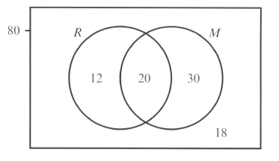Each child in a group of was asked whether they regularly read or regularly watch a movie The results are given in the Venn diagram opposite. One child is selected at random from the group. Event is 'a child who regularly reads is selected' and event is 'a child who regularly watches a movie is selected'.
Determine, with justification, whether events and are independent.



Important Questions on Probability
Two fair -sided dice, both with faces marked and are rolled.
Event is 'the sum of the numbers obtained is a prime number'.
Event is 'the product of the numbers obtained is an even number'
Find, in simplest form, the value of , of and of .
Two fair -sided dice, both with faces marked and are rolled.
Event is 'the sum of the numbers obtained is a prime number'.
Event is 'the product of the numbers obtained is an even number'
Determine, with justification, whether events and are independent.
Two fair -sided dice, both with faces marked and are rolled.
Event is 'the sum of the numbers obtained is a prime number'.
Event is 'the product of the numbers obtained is an even number'
Give a reason why events and are not mutually exclusive.
Two ordinary fair dice are rolled.
Event is 'the product of the two numbers obtained is odd'.
Event is 'the sum of the two numbers obtained is a multiple of
Determine, giving reasons for your answer, whether and are independent.
Two ordinary fair dice are rolled.
Event is 'the product of the two numbers obtained is odd'.
Event is 'the sum of the two numbers obtained is a multiple of
Are events and mutually exclusive? Justify your answer.
Event is 'one of the scores is exactly less than the other score'.
Event is 'the product of the scores is less than
Determine whether events and are independent, justifying your answer.
Two hundred children are categorised by gender and by whether or not they own a bicycle. Of the males, own a bicycle, and altogether children do not own a bicycle.
Tabulate these data.
Two hundred children are categorised by gender and by whether or not they own a bicycle. Of the males, own a bicycle, and altogether children do not own a bicycle.
Determine, giving reasons for your answer, whether ownership of a bicycle is independent of gender for these children.
